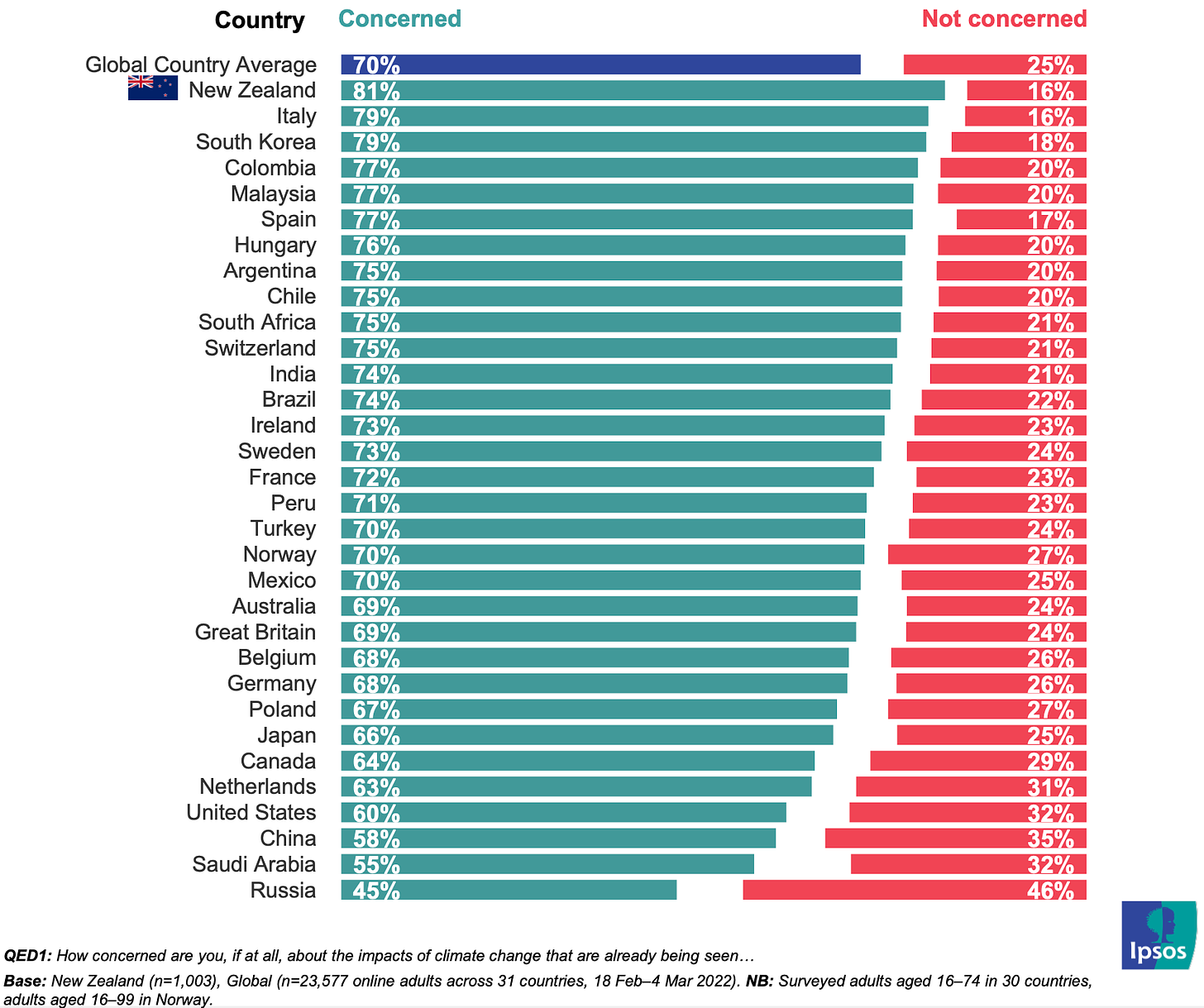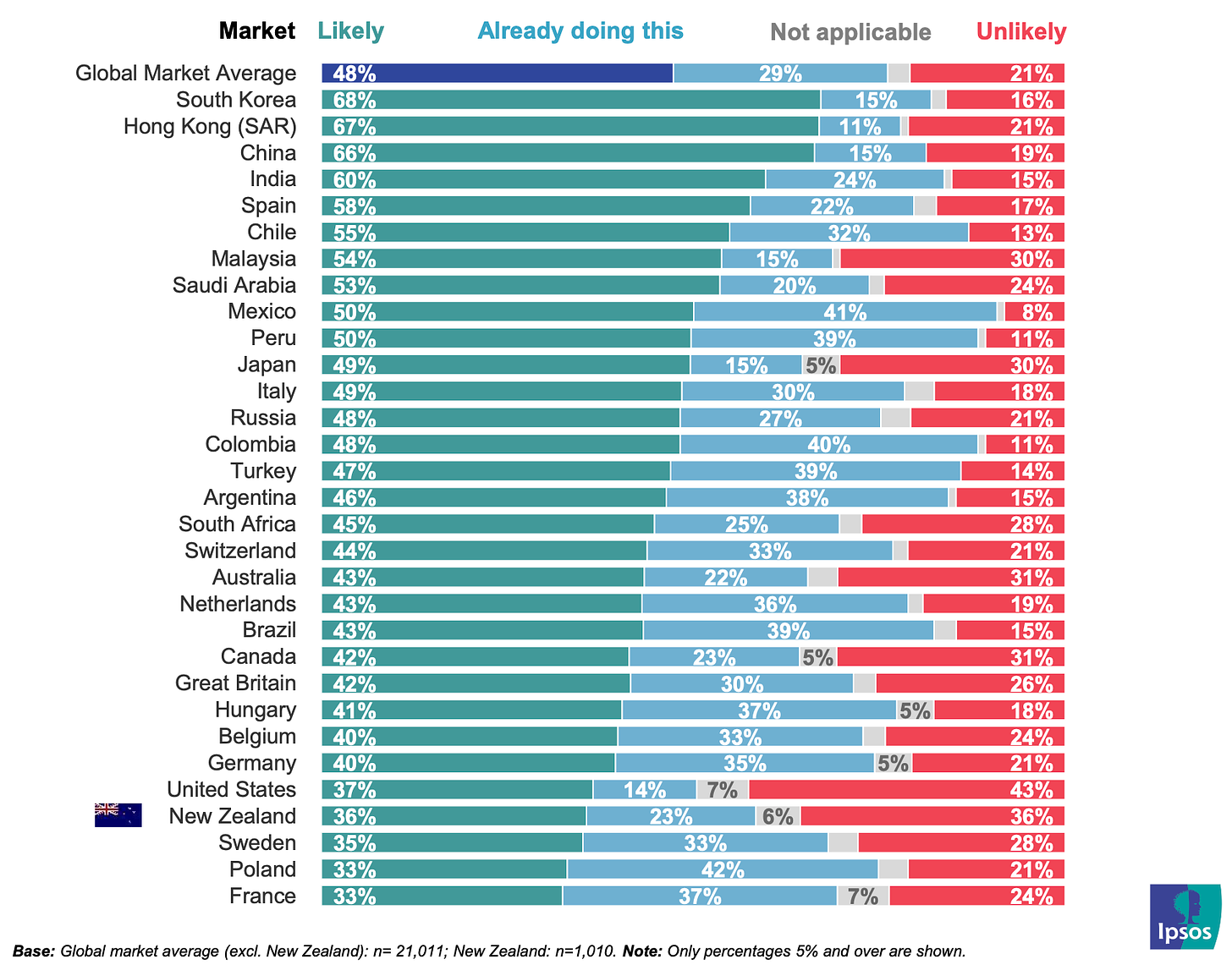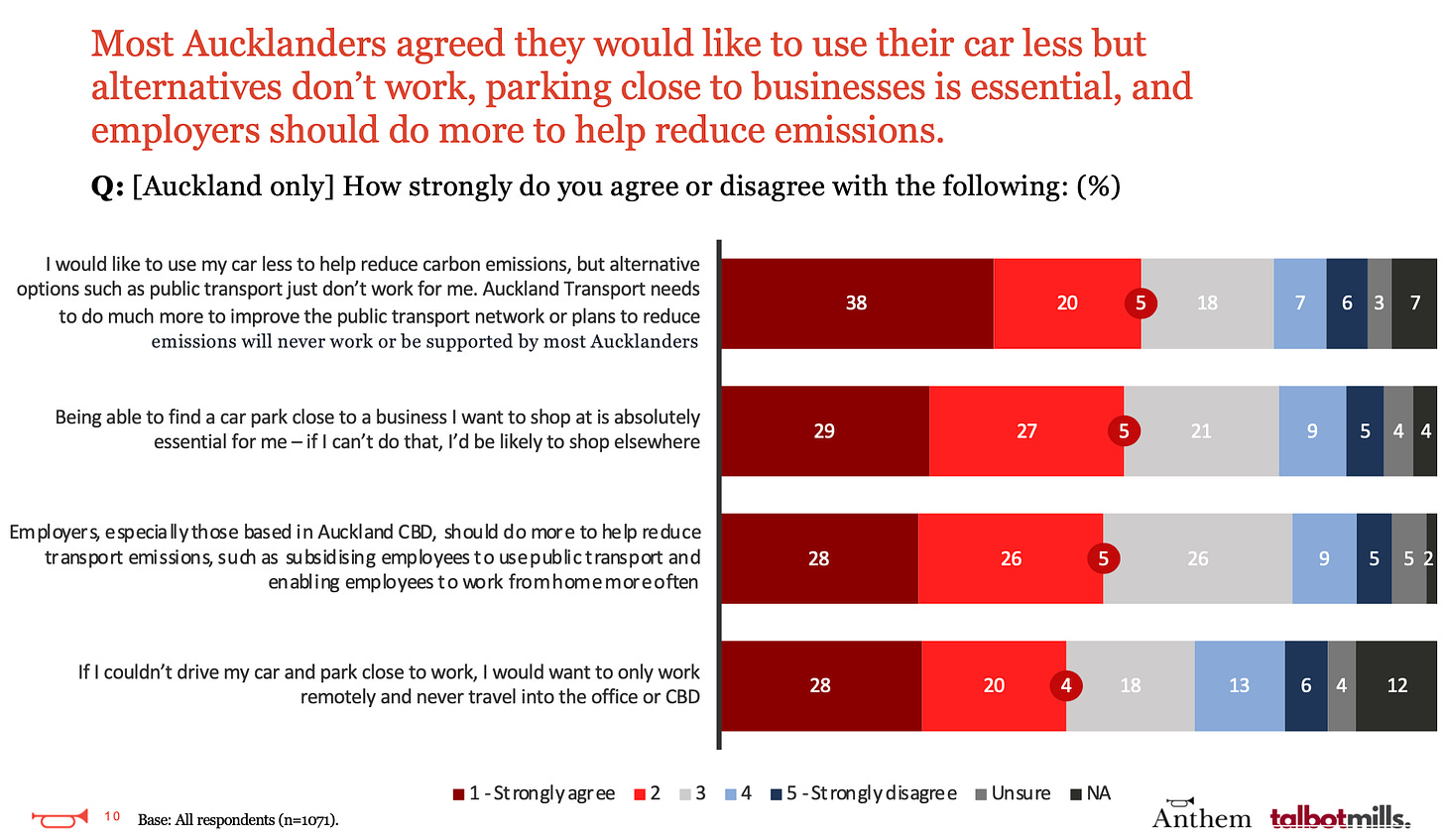
TLDR: So what would it take to shock Aotearoa’s voters and politicians into taking more substantial action to reduce climate emissions and prepare for climate change? You’d think our most expensive weather catastrophe in history might do the trick. Or even two of them inside three weeks? Yeah…nah.
A poll taken after the January 27 storms in Auckland found less than half of voters in Auckland and elsewhere up and down the motu thought they and various Governments should do more to combat climate change. This is consistent with other polls taken in the last three years, which show New Zealanders are less likely than in most other countries to want actions that would change our carbon-and-methane-emitting lifestyles.
We call ourselves ‘100% Pure’ and believe we’re greener and cleaner than most, but we’re actually less likely to vote for policies or take actual climate action ourselves than we think we would, and less than most others overseas. So, in today’s email and podcast, I take a closer look at:
how and why is Aotearoa’s political economy so climate-policy-averse?;
what could be done to change that?; and,
whether the cyclones of 2023 be the crises that shock us into more action?
The detail and analysis below the paywall fold and in the podcast above is for paying subscribers. They support the public interest journalism I do daily here on the political economy problems causing housing unaffordability and limiting climate change action and poverty reduction in Aotearoa. I’m asking them below in a poll if they’d like it opened up later today for public reading, listening and sharing. We love you to join us by subscribing.
Will Gabrielle be our nuclear-free moment for climate change?
It’s still early on Monday morning, but Cyclone Gabrielle looks set to be one of Aotearoa’s most damaging storms ever, if not the most damaging, and worse than our previous record, which was set at over $1 billion than three weeks ago.
So surely these events might change some of the political thinking around climate change action, both for politicians and voters? Not a skerrick so far, and that’s completely consistent with Aotearoa’s recent history of talking a much better game on climate change action than actually walking it.
PR firm Anthem published late on Friday the results of a poll of over 1,000 New Zealanders by Talbot Mills1 in the week after the January 27 storms. The poll found just 43% of New Zealanders and 48% of Aucklanders wanted to take quicker and more drastic action to reduce emissions. It found 23% of those surveyed nationwide wanted to reduce or slow emissions reduction, with 21% of Aucklanders wanting less action.

Just 33% of New Zealanders thought it “fair enough to restrict the use of cars and limit personal vehicle access in Auckland to help reduce carbon emissions,” while the same amount nationwide thought it unfair. The balance shifted in Auckland to 38% saying it was unfair to restrict vehicle use and 31% saying it was fair.
A more nuanced reading of the poll’s other questions finds Aucklanders would like to do more, but feel not enough was being done to improve alternatives for travel such as public transport, or simply did not believe it was possible to carry out their daily lives without using cars and car parks close to shops, schools and work.
When does reality disrupt the magic in our thinking?
In essence, New Zealanders generally, and Aucklanders in particular, believe we want more climate emissions reduction action, but not by us individually, not any time soon, and not in ways that would force them to either change their current life patterns or pay for others to do it. We have adopted the magical thinking promoted by politicians of both sides for at least the last 20 years that we can keep our current lifestyle and not have to either pay more taxes or charges, but still reduce emissions. This magical thinking, whether adopted consciously and deliberately, or through osmosis and sub-consciously, can keep working for as long as no-one they listen to calls bullshit on it and/or reality doesn’t intervene in an obvious way to disprove it.
On the face of it, the January 27 floods in Auckland and Cyclone Gabrielle should be one of these moments when the scales fall from the eyes of those who have either deliberately or by omission turned a blind eye to the issue.
The poll above appears to show we’re nowhere near giving up our magical thinking, although the same questions hadn’t been asked before the storm. It’s possible the sentiment is less magical than it used to be, although still concerningly magical.
We think way more magically than the rest of the world
So it’s useful to look at how our views have changed over time, relative to ourselves and to other countries facing the same issues.
PR and communications firm Ipsos conducts a monthly ‘Global Advisor Survey’ in 30 countries that looks at views on public issues including climate change. It surveys over 1,000 people in New Zealand and its most recent survey in on climate change early last year found New Zealanders were:
the most concerned about climate change in the world;
more optimistic about making significant improvements than most countries; and,
more confident than those in most other countries that their Government had a clear plan.

However, it also found we were:
among the least likely to take action that made a difference;
among the most likely to think recycling and using less package is the most effective thing to combat climate change, even though it is one of the least effective means; and,
among the least likely to change our travel habits to low emission methods, even though it is the most effective means of reducing emissions.
Likelihood of changing daily travel

In essence, New Zealanders think we’re doing enough, we’re doing better than most and we’re doing the right things. In actuality, we’re doing much less than enough, we’re doing worse than other countries and we’re doing mostly the wrong things.
We are the biggest magical thinkers on the planet.
So why so much magical thinking? And how to change it?
There’s a saying that all politics is local, which is often true, but these days most politics is actually performative. That means our politicians say loudly and often that they’re doing good things and that their voters are therefore doing good things. Voters will believe that as long as no-one points out that it is not true when they’re paying attention. It’s also because often voters don’t want to know the uncomfortable truth, especially when the alternative implication is having to make difficult, painful and expensive change, often that involves one powerful and dominant group giving up resources to groups or ‘others’ they don’t feel deserve those resources or collective help.
We may not be experts at taking effective climate change action, but we are experts at thinking and saying we are, largely because we keep electing people who talk like they’re taking action and no one is forcefully calling them out in public.
Our magical ‘nuclear-free’ moments
In my view, three of our largest political parties and their leaders can take the credit/blame for the performative nature of our climate change debate and actions over the last 20 years. Former Labour PM Jacinda Ardern made a big deal of declaring climate change was her generation’s ‘nuclear-free’ moment in the 2017 election campaign and by declaring a ‘climate emergency’ in Parliament in late 2020.
In reality, her Government and the one led over the last six weeks by her successor Chris Hipkins, has:
committed to spending $2.1 billion on cutting petrol taxes in a way that will increase carbon emissions by at least 84,000 tonnes;
limited the extent and ambition of its climate policies by specifying they be fiscally neutral, meaning policies such as the emissions trading system (ETS) and clean car rebate are small, complicated and ineffective;
gone slow on public transport investment and subsidies, also largely because they are funded by a fiscally-neutral fund built up by motorists believing it should be focused totalling on repairing and building roads and motorways, rather than paying for trains and buses for others to use;
allowed the three electricity gentailers the Government controls to keep prices very high to pay big dividends, rather than invest in new renewable generation;
agreed to extend ETS exemptions repeatedly for the biggest emitters in industry and agriculture;
decided against ETS changes and bio-fuels mandates in recent months because they would have increased petrol and diesel prices slightly; and,
failed to get Government departments to move to electric vehicles2 and boilers at any great scale.
Ardern’s predecessors, Bill English and John Key, also professed to want to be doing more to reduce emissions, but gutted the effectiveness of the ETS and allowed the mass purchasing of fraudulent carbon credits overseas.
The Green-washing of Labour’s nuclear-free non-moments
The failures of climate policies from 2008 to 2017 were pointed out loudly and often by the Labour and Green Parties when in Opposition, which increased the electoral potency of Ardern’s ‘nuclear-free moment’ appeal in her campaign-opening speech in August 2017.
The Opposition has been quiet on these failures since 2017 and the Green Party’s protests by MPs outside of the Government have not been heard, in large part because its co-leader James Shaw is also the Climate Change Minister and has been forced regularly into defending the inaction.
Rather than calling out the performative nature of the ‘nuclear-free’ moment policy inaction, the Greens ended up Green-washing Labour’s policies.
So how could it be done differently?
The IMF published a detailed paper over the weekend on how to improve the effectiveness of climate policies, based on a YouGov survey of 30,000 people in 30 countries, sadly not including Aotearoa.
It’s core findings:
Our survey shows that providing even small amounts of information on policy efficacy and benefits—including co-benefits, such as improved air quality and better health—can engender greater support. This support, however, may be short-lived if policy tradeoffs are not made explicit, highlighting the importance of ensuring the public understands the relative costs and benefits of available policy options.
Some of the most economically efficient policies, such as carbon pricing based on the content of fuels or their emissions, often face political resistance. Importantly, the survey highlights that climate concern alone doesn’t translate into broad support for carbon pricing policies such as carbon taxes or emissions trading systems.
Carbon pricing is more acceptable when presented along with information about the impact of climate change, how pricing works, and options for using the revenue it generates. Notably, people are more supportive of the policy if the revenues it generates are used to shield economically vulnerable groups from the adverse impact of climate policies.
Subsidizing green investments finds large support across all countries, while opponents often cite concerns about corruption and policy ineffectiveness even as proponents can sometimes fail to recognize the costs associated with these policies for the public budget. This suggests that public spending and investment efficiency matters in enhancing support for greening the economy.
In essence, carrots work better than sticks and leaders have to use some of their political capital explaining and arguing for the changes.
The IMF recommendations:
educate the public about the causes and consequences of climate change and the costs of inaction;
talk about the costs of inaction, such as pollution, and the benefits of addressing these, like improvements for air quality, health, and protection of low-income households;
emphasize that the policies work, so the trade-offs are worth it; and
underscore the shared spirit of solidarity and need for strong climate policies in a broad range of economies
In our context, this would mean prime ministers, mayors and other party leaders arguing in favour of policies that reduce emissions, using political and physical capital to subsidise climate actions, and pointing out the other health and social benefits of a just transition.
Here’s hoping for a bit more acting and a lot less performing.
Ka kite ano
Bernard
Talbot Mills is an independent opinion polling company that does polls for corporate clients, including the Labour Party.
Three years after Ardern being elected in 2017, the Government’s fleet of over 15,000 vehicles had just 18 electric vehicles, and is on track to achieve less than half its target of being emissions free by 2025.














Share this post